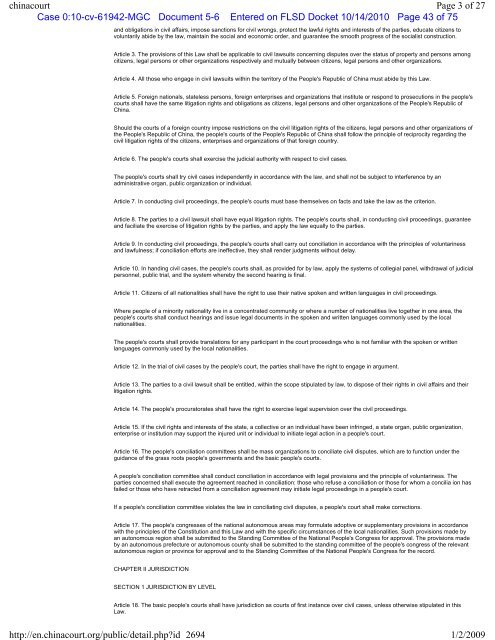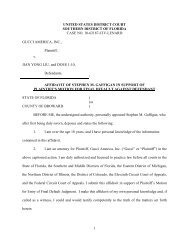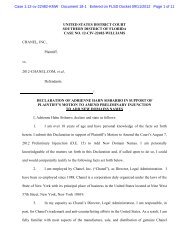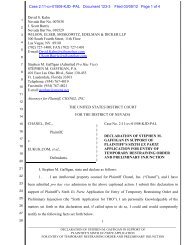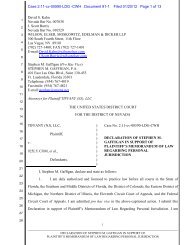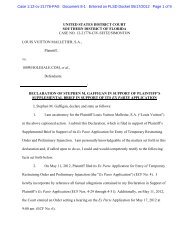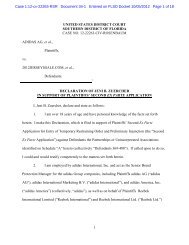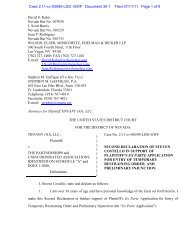UNITED STATES DISTRICT COURT SOUTHERN DISTRICT OF ...
UNITED STATES DISTRICT COURT SOUTHERN DISTRICT OF ...
UNITED STATES DISTRICT COURT SOUTHERN DISTRICT OF ...
You also want an ePaper? Increase the reach of your titles
YUMPU automatically turns print PDFs into web optimized ePapers that Google loves.
Case 0:10-cv-61942-MGC Document 5-6 Entered on FLSD Docket 10/14/2010 Page 43 of 75<br />
and obligations in civil affairs, impose sanctions for civil wrongs, protect the lawful rights and interests of the parties, educate citizens to<br />
voluntarily abide by the law, maintain the social and economic order, and guarantee the smooth progress of the socialist construction.<br />
Article 3. The provisions of this Law shall be applicable to civil lawsuits concerning disputes over the status of property and persons among<br />
citizens, legal persons or other organizations respectively and mutually between citizens, legal persons and other organizations.<br />
Article 4. All those who engage in civil lawsuits within the territory of the People's Republic of China must abide by this Law.<br />
Article 5. Foreign nationals, stateless persons, foreign enterprises and organizations that institute or respond to prosecutions in the people's<br />
courts shall have the same litigation rights and obligations as citizens, legal persons and other organizations of the People's Republic of<br />
China.<br />
Should the courts of a foreign country impose restrictions on the civil litigation rights of the citizens, legal persons and other organizations of<br />
the People's Republic of China, the people's courts of the People's Republic of China shall follow the principle of reciprocity regarding the<br />
civil litigation rights of the citizens, enterprises and organizations of that foreign country.<br />
Article 6. The people's courts shall exercise the judicial authority with respect to civil cases.<br />
The people's courts shall try civil cases independently in accordance with the law, and shall not be subject to interference by an<br />
administrative organ, public organization or individual.<br />
Article 7. In conducting civil proceedings, the people's courts must base themselves on facts and take the law as the criterion.<br />
Article 8. The parties to a civil lawsuit shall have equal litigation rights. The people's courts shall, in conducting civil proceedings, guarantee<br />
and faciliate the exercise of litigation rights by the parties, and apply the law equally to the parties.<br />
Article 9. In conducting civil proceedings, the people's courts shall carry out conciliation in accordance with the principles of voluntariness<br />
and lawfulness; if conciliation efforts are ineffective, they shall render judgments without delay.<br />
Article 10. In handing civil cases, the people's courts shall, as provided for by law, apply the systems of collegial panel, withdrawal of judicial<br />
personnel, public trial, and the system whereby the second hearing is final.<br />
Article 11. Citizens of all nationalities shall have the right to use their native spoken and written languages in civil proceedings.<br />
Where people of a minority nationality live in a concentrated community or where a number of nationalities live together in one area, the<br />
people's courts shall conduct hearings and issue legal documents in the spoken and written languages commonly used by the local<br />
nationalities.<br />
The people's courts shall provide translations for any participant in the court proceedings who is not familiar with the spoken or written<br />
languages commonly used by the local nationalities.<br />
Article 12. In the trial of civil cases by the people's court, the parties shall have the right to engage in argument.<br />
Article 13. The parties to a civil lawsuit shall be entitled, within the scope stipulated by law, to dispose of their rights in civil affairs and their<br />
litigation rights.<br />
Article 14. The people's procuratorates shall have the right to exercise legal supervision over the civil proceedings.<br />
Article 15. If the civil rights and interests of the state, a collective or an individual have been infringed, a state organ, public organization,<br />
enterprise or institution may support the injured unit or individual to initiate legal action in a people's court.<br />
Article 16. The people's conciliation committees shall be mass organizations to conciliate civil disputes, which are to function under the<br />
guidance of the grass roots people's governments and the basic people's courts.<br />
A people's conciliation committee shall conduct conciliation in accordance with legal provisions and the principle of voluntariness. The<br />
parties concerned shall execute the agreement reached in conciliation: those who refuse a conciliation or those for whom a concilia ion has<br />
failed or those who have retracted from a conciliation agreement may initiate legal proceedings in a people's court.<br />
If a people's conciliation committee violates the law in conciliating civil disputes, a people's court shall make corrections.<br />
Article 17. The people's congresses of the national autonomous areas may formulate adoptive or supplementary provisions in accordance<br />
with the principles of the Constitution and this Law and with the specific circumstances of the local nationalities. Such provisions made by<br />
an autonomous region shall be submitted to the Standing Committee of the National People's Congress for approval. The provisions made<br />
by an autonomous prefecture or autonomous county shall be submitted to the standing committee of the people's congress of the relevant<br />
autonomous region or province for approval and to the Standing Committee of the National People's Congress for the record.<br />
CHAPTER II JURISDICTION<br />
SECTION 1 JURISDICTION BY LEVEL<br />
<br />
Article 18. The basic people's courts shall have jurisdiction as courts of first instance over civil cases, unless otherwise stipulated in this<br />
Law.


